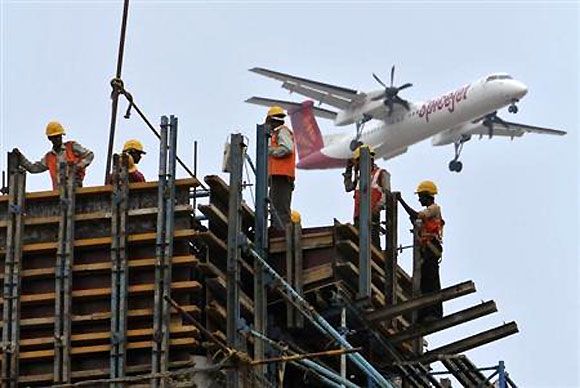 Fuelled by a slew of discount offers and in spite of an increasing financial burden, low-cost carrier (LCC) SpiceJet beat Jet Airways to become the second-largest domestic airline in July.
Fuelled by a slew of discount offers and in spite of an increasing financial burden, low-cost carrier (LCC) SpiceJet beat Jet Airways to become the second-largest domestic airline in July.
Its share of the market in the month stood at 20.9 per cent, compared with the Jet Airways-JetLite combine's 19.6 per cent.
The price war playing out in Indian aviation space and the impact of SpiceJet's frequent discount offers on other LCCs could be gauged from the fact that the market share of leader IndiGo also declined marginally to 30.7 per cent in July from 31.6 per cent the previous month.
The share of GoAir, another LCC, also saw a slight decline, from 10.1 per cent to 9.2 per cent.
In occupancy, SpiceJet's 79.4 per cent (against 67.9 per cent in July last year) was at least 10 percentage points higher than those of GoAir and IndiGo.
IndiGo's passenger load factor, at 67 per cent in July, fell six percentage points from the same month last year.
Interestingly, SpiceJet was the only Indian airline to report a rise in market share in July - its share in domestic traffic increased from 18.3 per cent the previous month.
GoAir and IndiGo, which had reported a steady monthly increase in market share from January to June, saw their first share drop this year. Air India's market share fell from 18.5 per cent in June to 18 per cent. Air Asia, which operates only eight flights a day, commanded 0.5 per cent of domestic traffic in the month.
According to analysts, SpiceJet's success in the month was mainly driven by its frequent discounted offers. However, they say, the airline is adding to its losses by offering fares lower than its cost price.
After a Rs 1,000-crore loss last financial year, the airline had reported a net loss of Rs 124 crore in the June quarter of this year. Its auditors have expressed concerns over its financial health and the airline has even come under scrutiny for delays in paying statutory dues.
In the past few months, SpiceJet has held flash sales to encourage forward bookings. While the industry saw these repeated sales as an attempt to mop up cash, the airline's management refused to talk about cash crunch.
"Our increase in loads and share is the result of our new network, improved branding and product and, most importantly, our dynamic pricing and revenue management approach, where we believe flying empty seats is a waste, especially for budget airlines," said SpiceJet Chief Operating Officer Sanjiv Kapoor in a statement.
"The increase in our loads this year has not been at the expense of yields. We are doing what is best for the airline, as well as customers. So, it is a win-win," he added.
Last week, Kapoor had remarked the airline was not blindly discounting fares. He had said it was simply following the global market simulation practice. "The world over, all low-cost airlines do it," he had said.
However, the stock market has not reflected the company's upbeat mood. During the period for which SpiceJet has reported an increase in market share, its shares slid from Rs 19.20 apiece on July 1 to Rs 13.80 each on July 31.
"July is a low season for all airlines and it is not surprising to see occupancy levels dipping. Even IndiGo, which shows high occupancy levels, has reported a seat factor of 67 per cent. What is it that SpiceJet did to achieve a higher seat factor? It defies logic," remarked a senior executive of a rival airline.
Kapil Kaul, chief executive of Centre for Asia Pacific Aviation (South Asia), said: "Sustained pricing actions have led to higher load factors. The key is to ensure such pricing initiatives are revenue-positive. Going forward, a targeted revenue management will be key. Significant easing in the Brent crude oil price is another positive that should help in recovery.












 © 2025
© 2025